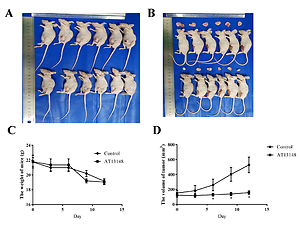Current issue
Archive
Manuscripts accepted
About the Journal
Editorial office
Editorial board
Section Editors
Abstracting and indexing
Subscription
Contact
Ethical standards and procedures
Most read articles
Instructions for authors
Article Processing Charge (APC)
Regulations of paying article processing charge (APC)
NEUROLOGY / CLINICAL RESEARCH
Study on the potential effect of multi-AGC kinase AT13148 on the Notch signaling pathway in glioblastoma
1
Department of Neurosurgery, Changhai Hospital, Second Military Medical University, Shanghai, China
2
Department of Rheumatology, Changzheng Hospital, Navy Medical University, Shanghai, China
Submission date: 2020-11-13
Final revision date: 2021-03-05
Acceptance date: 2021-03-28
Online publication date: 2021-04-04
Corresponding author
Zhijian Yue
Department of Neurosurgery, Changhai Hospital, Second Military Medical University, No. 168 Changhai Road, 200433, Shanghai, China
Department of Neurosurgery, Changhai Hospital, Second Military Medical University, No. 168 Changhai Road, 200433, Shanghai, China
KEYWORDS
TOPICS
ABSTRACT
Introduction:
Glioblastoma is the most malignant astrocytoma, and the efficacy of its therapy is not ideal. The Notch signaling pathway plays an important role in tumor proliferation and invasion. Whether the small molecule drug AT13148 can affect glioblastoma by regulating the Notch signaling pathway is the focus of this study.
Material and methods:
In vitro, the glioblastoma U87 cell line transfected with sh-ITGB1 (U87sh-ITGB1), the U87 cell line transfected with oe-ITGB1 (U87oe-ITGB1) and the control group were treated with the small molecular drug AT13148. RT-qPCR, western blot and clone formation ability assays were used to detect the mRNA and protein expression of the ITGB1 and the key gene NOTCH1, as well as the proliferation of cancer cells. Therapeutic effects of AT13148 were examined in vivo using a nude mouse model of U87 cells. After treatment with AT13148, volume of tumors was calculated, and RT-qPCR and western blot were used to evaluate the mRNA and protein expression of ITGB1 and NOTCH1.
Results:
AT13148 inhibits the activity of U87 cells. Lentiviral transfection of sh-ITGB1 and oe-ITGB1 can interfere with the expression of ITGB1 in U87 cells. AT13148 could down-regulate both the expression of ITGB1 and NOTCH1. Moreover, AT13148 affects the cloning ability of U87 cells. AT13148 can also inhibit the proliferation of U87 cells. Furthermore, AT13148 inhibited the proliferation and invasion of transplanted tumors in vivo.
Conclusions:
This study indicated that AT13148 could affect the expression of ITGB1 and NOTCH1, which also could be a potential anti-glioblastoma small molecule drug candidate in clinical medicine.
Glioblastoma is the most malignant astrocytoma, and the efficacy of its therapy is not ideal. The Notch signaling pathway plays an important role in tumor proliferation and invasion. Whether the small molecule drug AT13148 can affect glioblastoma by regulating the Notch signaling pathway is the focus of this study.
Material and methods:
In vitro, the glioblastoma U87 cell line transfected with sh-ITGB1 (U87sh-ITGB1), the U87 cell line transfected with oe-ITGB1 (U87oe-ITGB1) and the control group were treated with the small molecular drug AT13148. RT-qPCR, western blot and clone formation ability assays were used to detect the mRNA and protein expression of the ITGB1 and the key gene NOTCH1, as well as the proliferation of cancer cells. Therapeutic effects of AT13148 were examined in vivo using a nude mouse model of U87 cells. After treatment with AT13148, volume of tumors was calculated, and RT-qPCR and western blot were used to evaluate the mRNA and protein expression of ITGB1 and NOTCH1.
Results:
AT13148 inhibits the activity of U87 cells. Lentiviral transfection of sh-ITGB1 and oe-ITGB1 can interfere with the expression of ITGB1 in U87 cells. AT13148 could down-regulate both the expression of ITGB1 and NOTCH1. Moreover, AT13148 affects the cloning ability of U87 cells. AT13148 can also inhibit the proliferation of U87 cells. Furthermore, AT13148 inhibited the proliferation and invasion of transplanted tumors in vivo.
Conclusions:
This study indicated that AT13148 could affect the expression of ITGB1 and NOTCH1, which also could be a potential anti-glioblastoma small molecule drug candidate in clinical medicine.
Share
RELATED ARTICLE
We process personal data collected when visiting the website. The function of obtaining information about users and their behavior is carried out by voluntarily entered information in forms and saving cookies in end devices. Data, including cookies, are used to provide services, improve the user experience and to analyze the traffic in accordance with the Privacy policy. Data are also collected and processed by Google Analytics tool (more).
You can change cookies settings in your browser. Restricted use of cookies in the browser configuration may affect some functionalities of the website.
You can change cookies settings in your browser. Restricted use of cookies in the browser configuration may affect some functionalities of the website.



